Last month, a criminal lawyer from the Perry Barr district of Birmingham was charged with money laundering offences following a National Crime Agency investigation.
Akhmed Yakoob is not due to appear at Westminster Magistrates’ Court until the middle of this month but on Wednesday he came out fighting.
In a video posted on TikTok, where he has 212,000 followers, he railed against his arrest by counter-terrorism police, claiming that he was the victim of ‘a politically motivated attack’ prompted by his ‘political rise and vocal stances on Gaza‘. He added: ‘This is about silencing me, not justice.’
Until October 7, 2023, Yakoob was better known online for crowing about his collection of supercars.
The Birmingham-based solicitor – ‘Not a magician but a legal tactician’ – would pose in front of, say, a Rolls-Royce or a Lamborghini, while wearing vulgar jewellery and boasting about his wealth.
But following the October 7 massacre of 1,200 Israelis by Hamas terrorists – the biggest mass killing of Jews since the Holocaust – the tenor of his posts changed.
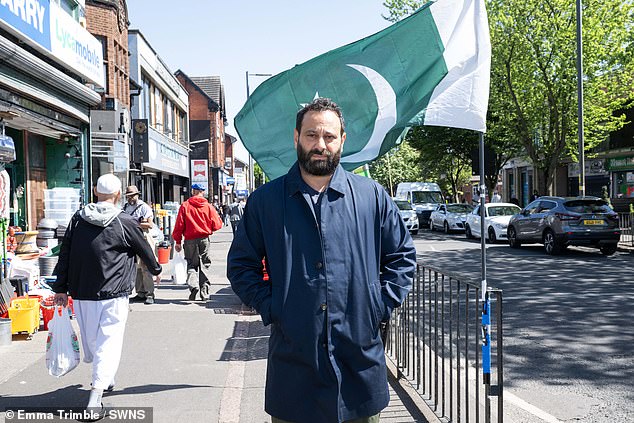
With a Pakistani flag blowing in the breeze behind him, David Patrikarakos wanders along Coventry Road in Small Heath, an inner-city ward which – according to the 2021 census – is 85.9 per cent Muslim, the highest percentage in Birmingham
And a month after October 7, Yakoob announced he would run for West Midlands mayor as an ‘independent’.
On the face of it, his campaign was doomed to fail. After all, Yakoob had no political experience and no army of canvassers to go door-to-door promoting his cause.
But that would be to reckon without the curious character of politics in Birmingham, Britain’s second largest city and one of its most segregated.
The 2021 census revealed that more than 50 per cent of the population was composed of ethnic minorities and, more importantly, 30 per cent described themselves as Muslim.
The story of how the so-called ‘TikTok lawyer’ became a serious political contender virtually overnight offers an instructive insight not just into how Gaza is infecting British politics but also the issues that are increasingly dividing the population of Birmingham.
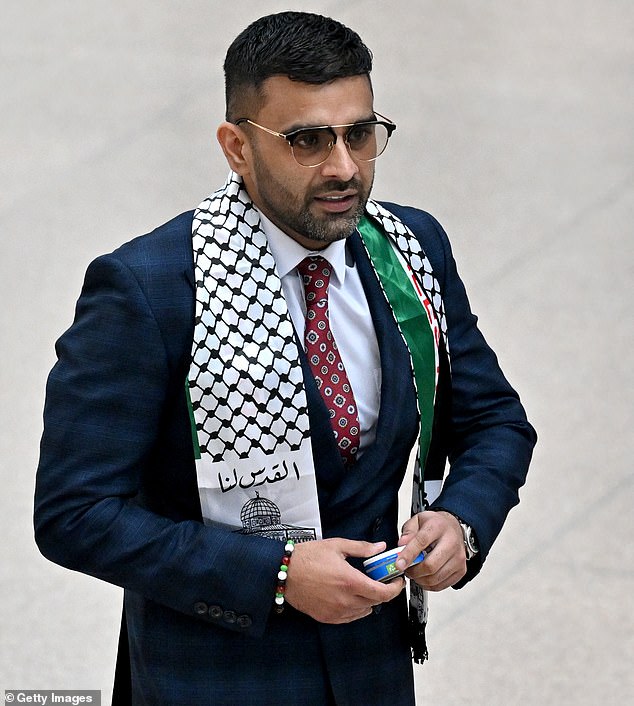
The 37-year-old Muslim, whose father came to Britain from Pakistan in the 1970s, has become a serious political contender virtually overnight, and gives insight into not just into how Gaza is infecting British politics but also the issues that are increasingly dividing the population of Birmingham
I visited the city earlier this month to investigate the growing influence of sectarian issues and Islamist entryism on British politics.
My first stop was Small Heath, an inner-city ward which – according to the 2021 census – is 85.9 per cent Muslim, the highest percentage in Birmingham.
Women swathed in black burqas glide silently along the pavement. Men in flowing robes and skull caps gather to talk outside shops and restaurants. Palestinian and Pakistani flags fly from lamp posts and shop fronts.
To my left is Beauty Queen Cosmetics which has a line of Arabic script above its pink-lettered shop sign. It’s the Quranic verse known as the Basmala: ‘In the name of Allah the most merciful and most beneficent.’
To my right, a clothes shop advertising itself as ‘Amsons: Your Islamic Lifestyle’ stands right by branches of betting chains Coral and Paddy Power, which offer a service forbidden unequivocally by Islam.
Small Heath is a changing Britain in microcosm. In the early 20th century, when the area was an industrial and manufacturing hub, Irish immigrants filled its clusters of terraced houses.
Women swathed in burqas in Small Heath – 36.3 per cent of Birmingham residents do not have English as their main language, while 15.9 per cent cannot speak English or speak it poorly
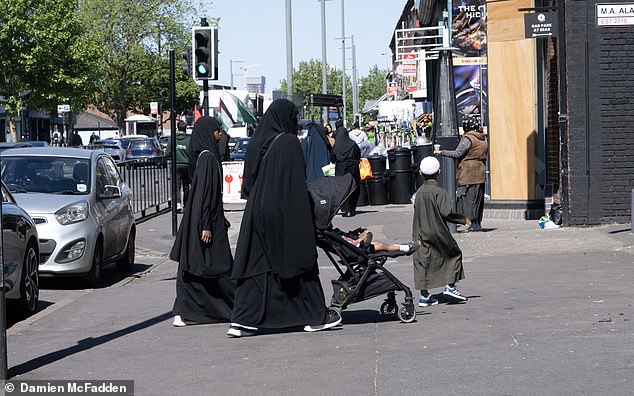
Amsons: Your Islamic Lifestyle sells everything from mugs with ‘Thank You, Allah’ written on them and traditional South Asian robes to an endless array of accoutrements, often in the colours of the Palestinian flag
Then, the Birmingham Small Arms Company was a prominent local employer. But the business collapsed in 1973 and, within a decade, swathes of housing here lay derelict.
Cheap property prices combined with the metropolitan appeal of Birmingham brought in another large wave of migration, this time of South Asian Muslims.
By 1991, according to research by Oxford University, 60 per cent of people in Small Heath were from an ethnic minority background.
It is in this context that Akhmed Yakoob has thrived. At first, more moderate members of Birmingham’s Muslim community considered his pitch for power absurd.
‘I dismissed it as clownish behaviour,’ says Nadeem Afzal, a family support worker for Birmingham’s child services, who I meet over breakfast in the Middle Eastern Damascena Cafe in central Birmingham. ‘But people from the community started paying attention.
‘Over time, his videos used Gaza more explicitly to push his candidacy. There was almost nothing in his literature about Birmingham or the West Midlands – and if there was occasionally, it was as an afterthought. So I started posting on Facebook about how this guy’s sectarian politics were dangerous.’
In the end, Yakoob – running on an unashamedly pro-Palestine ticket – came third in the May 2, 2024 mayoral election with almost 70,000 votes. Emboldened by this strong showing, he vowed to do the same in the general election two months later.
David outside the Shia-Husaynia Mosque, its white dome rising behind black wrought iron gates. Another local mosque was the subject of an exposé by Channel 4’s Dispatches that claimed one preacher said women were ‘deficient’ and another argued that girls should be ‘hit’ if they refused to wear a hijab
‘I knew then that the election would be the mother of all s**t fights,’ says Nadeem.
Yakoob ran against the sitting Labour MP Shabana Mahmood in the Birmingham Ladywood constituency – and things soon got nasty.
‘Yakoob’s people accused her and Labour of covering up for genocide,’ recalls Nadeem. ‘It was targeted harassment and hate.’
Yakoob didn’t win. But he came a close second with 33.2 per cent of the vote.
And the ‘independents’ had success elsewhere. In the run up to the 2024 general election, Ayoub Khan, a Liberal Democrat, resigned from his party (though he remains a councillor), in protest at being ordered to undertake anti-Semitism training after questioning the extent of crimes committed by Hamas on October 7.
He ran as an ‘independent’ for the seat of Birmingham Perry Barr, co-ordinating his campaign with Yakoob in the neighbouring Ladywood constituency. ‘A vote for us is a vote for Gaza,’ proved to be a winning slogan for Khan: he defeated the incumbent Labour MP by 507 votes.
Nadeem Afzal despairs. Not least when a group of politicians, including Tahir Ali, the MP for Birmingham Hall Green and Moseley, wrote a letter to the prime minister of Pakistan urging him to build an airport in faraway Kashmir.
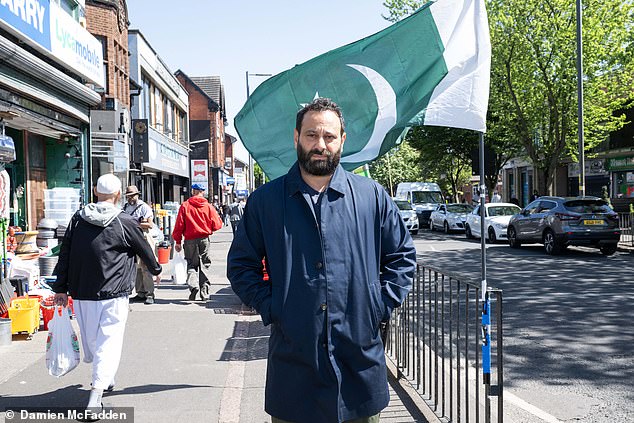
In Birmingham, David came face to face with the poisonous effects of sectarian politics, but he also met proud British Muslims like Nadeem Afzal, who are models of integration and tolerance, determined to speak out
‘Now the perception is growing that Birmingham’s MPs are more interested in airports in Pakistan than infrastructure at home,’ says Nadeem. But what about Birmingham? What about services, budgets? Instead, it’s ‘Why haven’t you said anything about Kashmir or Gaza?’
‘I have no doubt that, based on sectarian voting patterns, next year’s local elections will be a bloodbath for Labour. And if independents flood the councils, nothing will get done because all they care about is Gaza. And in the end, none of this makes any difference to Gaza anyway.’
A proud Muslim and a proud Brummie, he is clearly distressed at the influence of sectarian politics on his beloved city.
A stroll down Small Heath’s main drag, Coventry Road, shows just how varied the city’s Muslim population is – and this is key to its politics.
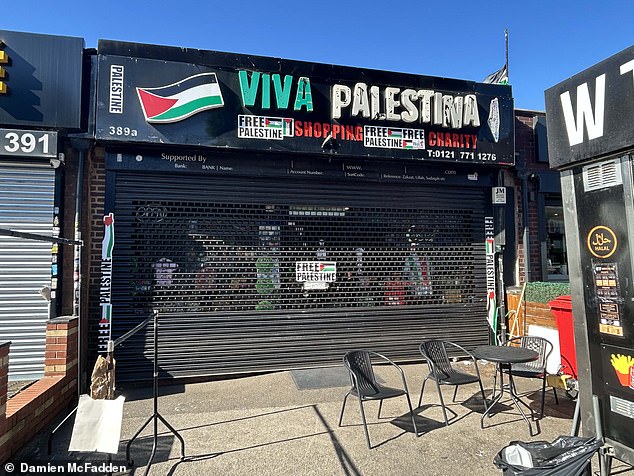
A few doors along from Amsons is Viva Palestina, which specialises in Palestine-themed products
Birmingham City Council records that 17.4 per cent of people in Small Heath are Bangladeshi, 50.8 per cent Pakistani, 1.4 per cent Indian, and just 5.9 per cent White. And many are clearly not well integrated: 36.3 per cent of residents do not have English as their main language, while 15.9 per cent cannot speak English or speak it poorly.
These tumultuous demographic changes are imprinted onto the fabric of the city. Just off Coventry Road is the Shia-Husaynia Mosque, its white dome rising behind black wrought iron gates. To the west, up Green Lanes, is a Salafi Mosque that was once the subject of an exposé by Channel 4’s Dispatches that claimed one preacher said women were ‘deficient’ and another argued that girls should be ‘hit’ if they refused to wear a hijab.
Around me are Somalian money exchanges, Bangladeshi banks, Lebanese restaurants and Pakistani supermarkets.
I pay a visit to Amsons, which sells everything from mugs with ‘Thank You, Allah’ written on them and traditional South Asian robes to an endless array of accoutrements, often in the colours of the Palestinian flag.
In the children’s book section the titles on offer include ‘Allah Knows All About Me’ and ‘The Prophet Mohammad’s Stories for Children.’
A few doors along is Viva Palestina, which specialises in Palestine-themed products. Zamir, a local of Pakistani origin, is talking to the young Somalian teenager who is manning the shop. ‘Trying to keep him out of the clutches of the Wahhabis [a strict Sunni Muslim sect],’ he says jokingly.
Ayoub Khan ran as an ‘independent’ for the seat of Birmingham Perry Barr. ‘A vote for us is a vote for Gaza,’ proved to be a winning slogan for Khan: he defeated the incumbent Labour MP by 507 votes
Khalid Mahmood, the Labour MP who lost his Perry Barr seat to Ayoub Khan last year. He says that the mixed nature of Britain’s Muslim communities was key to Khan’s victory, and to the success of three other Muslim independent candidates who won seats across the country on pro-Gaza tickets
Outside a smiling man approaches us. It’s friend of Zamir’s, Dr Majeed, a local GP. As we try to cross the road, weaving between honking and screeching cars, he says: ‘This is how they drive in India. My wife won’t drive in Birmingham because she says she had enough of it there.’
Small Heath illustrates not only how our Muslim population is growing but, as the website UK Election Analysis observes, Muslim Britons are most likely to live in concentrated urban areas.
It means that these communities are an increasingly important electoral force because, under the UK’s first-past-the-post system, they constitute powerful blocs, as Labour is finding to its cost. Until relatively recently, the party could rely on Muslim communities for their support.
According to the Labour Muslim Network, there were – before the recent council elections – over 500 Muslim councillors in the UK, of whom over 75 per cent were affiliated to Labour. In the 2019 general election, over 80 per cent of Muslims voted Labour.
But things are changing. And it’s not domestic but foreign politics that is moving the dial. In the 2024 election, in seats where more than 10 per cent of the population identified as Muslim, Labour’s vote share decreased by 11 points on average – a shift attributed to Labour’s perceived inaction on Gaza. In 21 seats where more than 30 per cent of the population was Muslim, Labour’s vote share dropped by 29 points.
One man who has seen this phenomenon at close quarters, of course, is Khalid Mahmood, the Labour MP who lost his Perry Barr seat to ‘independent’ Ayoub Khan last year.
He tells me that the mixed nature of Britain’s Muslim communities was key to Khan’s victory, and to the success of three other Muslim independent candidates who won seats across the country on pro-Gaza tickets.
‘In the four seats we lost, it’s noticeable that all of them had a reasonable proportion of Gujarati Muslims from India and Pakistan,’ says Mahmood. ‘The Gujarati Muslims are very much aligned with The Muslim Vote and the Muslim Council of Britain [MCB].’
The Muslim Vote is a pressure group whose mission, according to its website, is to put ‘Muslim issues at the forefront… We [Britain’s Muslim community] are a powerful, united force of 4 million acting in unison.’
Mahmood continues: ‘The Muslim Vote is very much an Islamist organisation. I’ve been one of their key targets [since they were founded about a year ago]. Since 9/11, I’ve stood against Islamists and all their efforts to infiltrate Labour politics, which they’ve done quite successfully through MCB and MEND [Muslim Engagement and Development].’
MEND is another organisation determined to make its mark on British politics. It presents itself as campaigning for the interests of British Muslims but has been linked to – and even shared staff with – groups as notorious as Cage, which advocated for Yemeni cleric Anwar al-Awlaki, who went on to lead al-Qaeda in the Arabian Peninsula.
Despicably, Cage’s research director announced on television in 2015 that Isis butcher ‘Jihadi John’ was a ‘beautiful young man’.
A counter-extremism expert later explains to me why the type of entryism into British politics seen in Birmingham is so dangerous.
‘People think it’s just single-issue politics about Palestine and Gaza but it’s more pernicious,’ they tell me. ‘Gaza is wrapped up in a broader Islamist and separatist agenda. Note how support for Gaza is not based on human rights but Muslim loyalty to Palestine.
‘While the Gaza images are appalling, the genocide in Sudan is closer to home for the many Somalians, Sudanese and Yemenis here. Yet it animates people less.
‘There is little focus on the Rohingya genocide in Myanmar, where over 700,000 Muslims have fled persecution, or on reports of up to three million plus Uighurs in camps in Xinjiang in China. This is because Palestine is the cause celebre of the Muslim Brotherhood and Islamist entryism.’
In Birmingham, I came face to face with the poisonous effects of sectarian politics. But I also met proud British Muslims like Nadeem Afzal, who are models of integration and tolerance, determined to speak out because they are principled and brave.
It is for the sake of their communities, as well as British society generally, that the boil of sectarian politics and Islamist entryism must be lanced.
It is pernicious, and also despised by many Muslim Britons, who despair at its deleterious effect on their communities and on public life.
We must help them to confront it and emerge victorious because, believe me, the cost of defeat will be too great to bear, for all of us.












